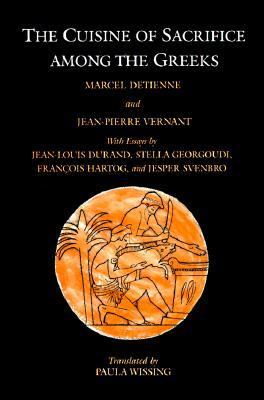2109258
9780226143538
Cuisine of Sacrifice Among the Greeks
by Detienne, Marcel, Vernant, Jean-Pierre, Wissing, Paula
About this item
- Condition: New
- Provider: LightningBooks
- Provider Rating: 85%
- Ships From: Multiple Locations
- Shipping: Standard, Expedited (tracking available)
- Comments: Fast shipping! All orders include delivery confirmation.

About this item
- Condition: Good
- Provider: BooksRun
- Provider Rating: 95%
- Ships From: Philadelphia, PA
- Shipping: Standard, Expedited
- Comments: Ship within 24hrs. Satisfaction 100% guaranteed. APO/FPO addresses supported

Product details
- ISBN-13: 9780226143538
- ISBN: 0226143538
- Publication Date: 1989
- Publisher: University of Chicago Press
AUTHOR
SUMMARY
For the Greeks, the sharing of cooked meats was the fundamental communal act, so that to become vegetarian was a way of refusing society. It follows that the roasting or cooking of meat was a political act, as the division of portions asserted a social order. And the only proper manner of preparing meat for consumption, according to the Greeks, was blood sacrifice. The fundamental myth is that of Prometheus, who introduced sacrifice and, in the process, both joined us to and separated us from the gods--and ambiguous relation that recurs in marriage and in the growing of grain. Thus we can understand why the ascetic man refuses both women and meat, and why Greek women celebrated the festival of grain-giving Demeter with instruments of butchery. The ambiguity coded in the consumption of meat generated a mythology of the "other"--werewolves, Scythians, Ethiopians, and other "monsters." The study of the sacrificial consumption of meat thus leads into exotic territory and to unexpected findings. In "The Cuisine of Sacrifice, the contributors--all scholars affiliated with the Center for Comparative Studies of Ancient Societies in Paris--apply methods from structural anthropology, comparative religion, and philology to a diversity of topics: the relation of political power to sacrificial practice; the Promethean myth as the foundation story of sacrificial practice; representations of sacrifice found on Greek vases; the technique and anatomy of sacrifice;Detienne, Marcel is the author of 'Cuisine of Sacrifice Among the Greeks', published 1989 under ISBN 9780226143538 and ISBN 0226143538.
[read more]


